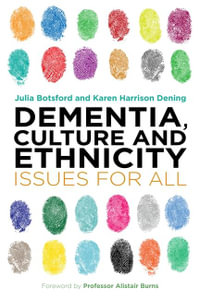Advocating doll therapy as an intervention for people with dementia, this book combines theory and evidence to show its many benefits and present guidelines for best-practice.
Despite being widely and internationally used, doll therapy is a controversial and often misunderstood intervention. This book debunks the myths surrounding doll therapy, highlighting its proven positive impact on the well-being of people with dementia. The book gives care professionals an indispensable overview of doll therapy within the context of current advocated best practices, using original research and evidence to present the rationale of its use. The book also engages with ethical issues, ensuring that professionals are aware of the aspects of doll-therapy that may be counter-productive to person-centred care. Providing clear guidelines on how best to utilise doll therapy, this comprehensive book is an important resource for any professional looking to implement this intervention.
Industry Reviews
I was asked to review Doll Therapy in Dementia Care by Gary Mitchell. To be honest I was reluctant to believe this could be used to alleviate distress or agitation. After reading the book two times as a person who has Alzheimer's and PCA I thought it was written by a person who clearly had empathy and clearly illustrated how individuals at a later stage of dementia could satisfy their inner feelings of need, being loved and wanted. The most important aspects of care that a family want for their loved ones is ensuring they are content and happy within their environment. It can be very difficult for relatives watching their mum or family member cuddling an inanimate doll. Yet perceptions can change once they see their "loved one smile with pleasure at holding something close to love again." The image of an older person cuddling and singing to a doll can seem strange and incongruous. Yet I realise I had the same need and when my grandson was born I was doing the same thing but instead of being a doll it was a real baby. I couldn't get enough. I had such a yearning to hold, love and want to have this baby as much as I could. The moral and ethical dilemmas should not supersede the reality of the beneficial impact - every person has a vivid desire to express affection, physical nurturing and emotional attachment that is clearly stored in the repository of their brains irrespective of what type of dementia or stage they are at.

























